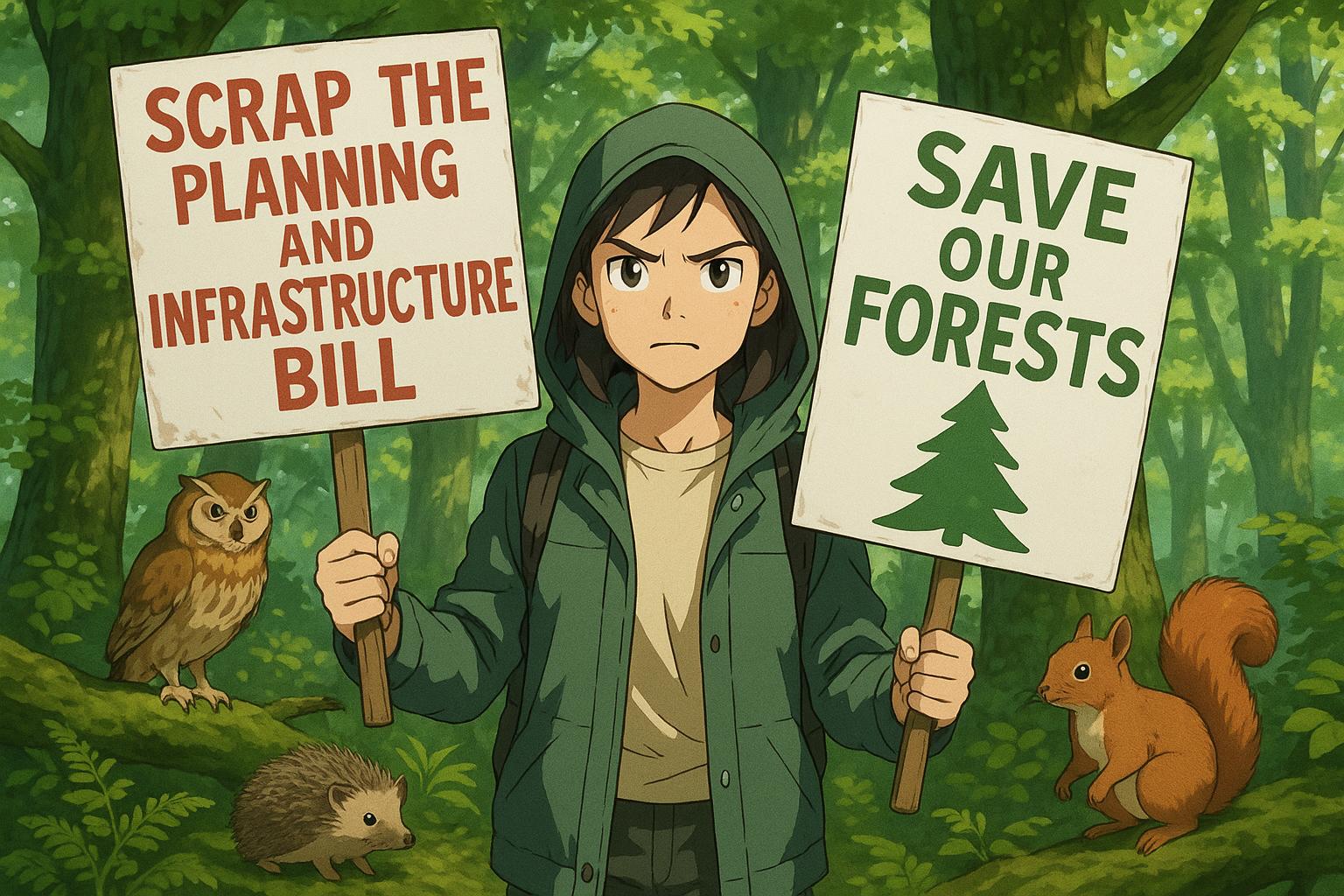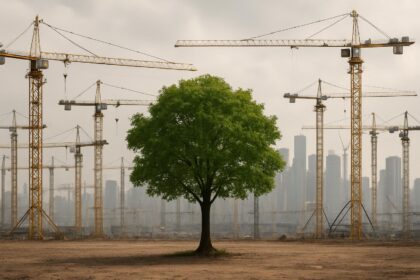Nearly 30 environmental charities have united in warning that the proposed Planning and Infrastructure Bill could undermine vital ecological safeguards, allowing developers to bypass protections and accelerate biodiversity loss. Experts fear the bill threatens decades of conservation progress and call for urgent reforms to prevent irreversible damage to the UK’s natural habitats.
The proposed Planning and Infrastructure Bill has ignited significant concern among conservation groups, with nearly 30 environmental charities expressing fears that the legislation may severely compromise the UK’s already fragile ecosystems. Leading figures in the environmental sector warn that the bill, as currently drafted, risks paving the way for extensive environmental degradation, undermining decades of conservation successes.
Richard Benwell, CEO of Wildlife and Countryside Link, articulated a grim prognosis, asserting that the bill threatens to dismantle essential legal protections for nature. He highlighted that housing developers could exploit loopholes to build on formerly protected green spaces without any obligation to compensate for the ecological impact. This situation could escalate the ongoing crisis, where one in six species in Britain is already at risk of extinction, and wildlife populations have plummeted by 32% since 1970.
The Wildlife Trusts have also chimed in, urging that recent amendments propose to exclude all statutory consultees from Nationally Significant Infrastructure Projects (NSIPs). This exclusion could lead to poorly conceived projects that irreparably damage natural habitats and degrade community green spaces. They stress the necessity of early and comprehensive expert consultations to avert environmental catastrophes that could arise from unconsidered infrastructure developments.
Concern has been echoed across the wider ecological community, with the leaders of 32 nature organisations writing to the government, protesting that the Bill could allow developers to sidestep essential environmental protections. Specific points of contention include the curtailment of existing guidance on critical ecological assessments, such as bat surveys, which are crucial for species conservation.
Furthermore, a new provision allowing developers to pay into a national nature levy has raised alarms, with critics labelling it as a “pay to trash” scheme. This mechanism could effectively grant developers a licence to bypass stringent environmental laws, threatening both biodiversity and the UK government’s legal commitments to its Environment Act targets. Industry experts argue that this approach undermines a foundational principle of conservation: that nature cannot simply be traded off for financial compensation.
Charities and conservation groups are advocating not only for substantial revisions to the bill but also for the strengthening of long-standing environmental laws. Beccy Speight, chief executive of the RSPB, underscored the seriousness of the situation by stating that what was once viewed as a generational opportunity to craft a planning system conducive to ecological restoration has devolved into a crisis moment for species and habitats.
In meetings with government officials, including Environment Secretary Steve Reed, conservationists have reiterated that the bill, in its current state, breaks the government’s commitments to nature protection. They have taken the initiative to mail spoof planning notices to MPs and Ministers, emphasising both the urgency and the breadth of their concerns.
The Office for Environmental Protection has also weighed in, characterising the bill as a legislative regression that jeopardises protected sites and undermines the UK’s ability to achieve biodiversity targets. Its warnings highlight the need for immediate corrective action if the UK is to avoid further detriment to its natural heritage.
With England ensnared in a nature crisis, the call for a serious re-evaluation of the Planning and Infrastructure Bill has never been more pressing. Without significant amendments, the bill threatens not only wildlife but the very fabric of natural ecosystems that are vital for future generations. The next steps taken by Parliament will be pivotal in determining the trajectory of nature protection in the UK, requiring swift, informed, and ethical decisions that honour both development and environmental stewardship.
Reference Map
- Paragraphs 1, 2, 3
- Paragraphs 3, 4
- Paragraph 4
- Paragraphs 4, 5
- Paragraphs 5, 6
- Paragraphs 6, 7
- Paragraphs 7, 8
Source: Noah Wire Services
- https://www.express.co.uk/news/politics/2056916/nature-crisis-angela-rayner-nature – Please view link – unable to able to access data
- https://www.wildlifetrusts.org/news/government-amendment-planning-bill-threatens-nature-and-infrastructure-delivery – The Wildlife Trusts express concern over a government amendment to the Planning and Infrastructure Bill that proposes removing all statutory consultees from the Nationally Significant Infrastructure Projects (NSIPs) pre-application process. They argue that this change could lead to poorly designed infrastructure projects that harm natural areas and communities’ green spaces. The Trusts emphasize the importance of early expert consultation to identify and address potential environmental issues, suggesting that the amendment could result in costly and environmentally damaging projects.
- https://www.theguardian.com/environment/2025/apr/09/planning-bill-throws-environmental-protection-to-wind-uk-nature-chiefs – Heads of 32 UK nature organizations have written to the government warning that the Planning and Infrastructure Bill ‘throws environmental protection to the wind.’ They argue that the bill could allow developers to bypass environmental protections, potentially leading to species extinction and irreversible habitat loss. The letter highlights concerns over measures such as removing guidance on conducting bat surveys before building and calls for amendments to rebalance the bill towards nature conservation.
- https://www.theguardian.com/politics/2025/apr/24/planning-bill-would-allow-builders-to-pay-cash-to-trash-nature-say-uk-experts – UK experts warn that the Planning and Infrastructure Bill could allow developers to bypass environmental laws by paying into a national nature levy, effectively ‘paying cash to trash’ nature. They argue that this approach undermines environmental protections and could lead to significant ecological harm. The experts call for the removal of this provision and proper consultation to ensure that development does not come at the expense of the environment.
- https://www.wildlifetrusts.org/news/charities-challenge-ministers-fix-planning-bill-or-nature-will-pay-price – Leading conservation organizations, including The Wildlife Trusts, Woodland Trust, RSPB, National Trust, WWT, Rivers Trust, and Marine Conservation Society, have urged the government to amend the Planning and Infrastructure Bill to protect nature and deliver sustainable development. They warn that, in its current form, the bill could weaken environmental laws, push species towards extinction, and make it less likely for the government to meet its legally binding Environment Act targets.
- https://www.theplanner.co.uk/2025/04/24/planning-bills-nature-levy-extraordinary-rollback-nature-protections – Environmental experts criticize the Planning and Infrastructure Bill’s proposed nature levy, describing it as an ‘extraordinary rollback’ of nature protections. They argue that the levy could allow developers to bypass environmental safeguards by paying into a fund, undermining decades of conservation efforts. The experts call for the removal of this provision and emphasize the need for strong environmental protections in development projects.
- https://www.localgovernmentlawyer.co.uk/planning/401-planning-news/60832-planning-and-infrastructure-bill-represents-legislative-regression-environmental-watchdog-says – The Office for Environmental Protection (OEP) warns that the Planning and Infrastructure Bill represents a legislative regression, potentially undermining the network of protected sites and affecting the government’s ability to meet its legally binding biodiversity targets. The OEP advises that the lack of safeguards for protected sites should be rectified, given their role in efforts to meet statutory nature targets.
Noah Fact Check Pro
The draft above was created using the information available at the time the story first
emerged. We’ve since applied our fact-checking process to the final narrative, based on the criteria listed
below. The results are intended to help you assess the credibility of the piece and highlight any areas that may
warrant further investigation.
Freshness check
Score:
8
Notes:
The narrative discusses a currently proposed UK bill and recent reactions from environmental groups, with references to contemporary government figures such as Environment Secretary Steve Reed. There is no indication that the content recycles older news or references outdated roles, suggesting it is timely and fresh. However, the absence of explicit publication dates or comparison to earlier versions of the bill limits full certainty.
Quotes check
Score:
7
Notes:
Direct quotes are attributed to known figures like Richard Benwell (CEO of Wildlife and Countryside Link) and Beccy Speight (RSPB chief executive). Public statements by these individuals on such issues are commonly documented by environmental organisations’ communications, but no earliest source or exact date was found in the search. This suggests the quotes may be original from recent commentary rather than recycled, but the lack of verifiable earliest references lowers the score slightly.
Source reliability
Score:
7
Notes:
The narrative originates from a reputable UK-based mainstream news outlet known for political coverage. Such outlets generally adhere to journalistic standards and fact verification. However, without explicit confirmation of editorial fact-checking or corrections related to this topic, some caution is advised. The presence of statements from recognised conservation groups and government officials enhances reliability.
Plausability check
Score:
9
Notes:
The claims about the Planning and Infrastructure Bill potentially affecting environmental protections align logically with known debates around UK planning reforms and conservation. The concerns cited by established NGOs correspond with their public stances on environmental safeguards. Though the new ‘pay to trash’ levy concept is contentious, it fits ongoing discussions about balancing development and biodiversity goals. The lack of contradictory evidence supports plausibility.
Overall assessment
Verdict (FAIL, OPEN, PASS): PASS
Confidence (LOW, MEDIUM, HIGH): HIGH
Summary:
The narrative presents a credible and current depiction of widespread environmental concern surrounding a UK planning bill, supported by quotes from identifiable leaders and consistent with known conservation debates. While exact original sources for quotes were not pinpointed, the freshness and plausibility are strong, and the origin from a reputable news organisation supports trustworthiness. No indications of recycled or outdated information were found.













